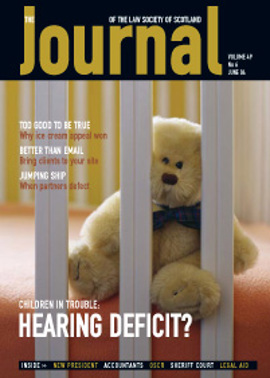Through a glass less darkly
The white paper on the proposed reform of Scotland’s liquor licensing laws was unveiled on 17 May at a conference addressed by the Justice Minister, Cathy Jamieson. Described as “A Consultation on Liquor Licensing”, this is the Scottish Executive’s response to the Nicholson Committee Report. This article assumes some knowledge of the content of Nicholson – see the Journal for September 2003.
It is confirmed that the Nicholson principles will be enshrined in the legislation. These are:
- the prevention of crime or disorder;
- the promotion of public safety;
- the prevention of public nuisance;
- the promotion of public health;
- the protection of children from harm.
The constitution of the United States of America was founded on principles, and has been fertile ground for lawyers for over 200 years. How will this legislation fare?
Much will depend on the detail. This does seem to be a genuine attempt at consultation – answers are sought to questions on most issues. In future, certain matters will be decreed at national level and some at local level, by existing licensing boards. It is to be hoped that the big decisions will be taken nationally. The trade and its advisers despair at the way our biggest industry, leisure and hospitality, is regulated in a patchwork manner. Standard conditions prevailing throughout the country will be acceptable; significant local variations between counties will not.
The best bits of Nicholson are all here. Henceforth there will be a requirement to hold a personal licence, in addition to a premises licence. A personal licence will last for 10 years; a premises licence will last indefinitely. There was much debate about the premises licence. Some argued against a “one size fits all” approach. There were calls for the distinction between on and off-sale licences to be retained, with some groups favouring a separate category for premises operating late at night. Every licensed establishment will have to have an operating plan. Considerable care will have to be taken in the drafting of these. This plan will specify the opening hours. As the plans will have to be approved by licensing boards, it is likely that local variations and anomalies will remain. It will be necessary, however, for licensing boards to issue and review policies on opening hours and overprovision.
This latter topic may become a very hot potato indeed. A spokesperson for the Justice Minister recently suggested that overprovision could become a reason for refusing to renew an existing licence. The consequences of that could be quite horrendous for established businesses, and it is to be hoped that common sense will prevail.
We are still no clearer as to how the evil of binge drinking is to be eradicated. Irresponsible promotions are currently the talk of many towns, with initiatives already being taken by the Glasgow, and Perth and Kinross boards. The hope is that this will ultimately be resolved at national level, through standard operating plan conditions. If matters are dealt with locally, we will inevitably find that an “irresponsible promotion” in county A is “acceptable retail practice” in county B next door.
As one would expect, the correlation between children and licensed premises is a vexed one. Nicholson supported a presumption in favour of allowing children in. The new law will provide the opposite. This means that even a licensed grocery or supermarket will have to stipulate in its operating plan that it intends to allow children to enter. Conditions may be attached to this. Chapter 10 of the white paper states: “We want pubs to become more child friendly in Scotland and to encourage an environment where families can socialise safely together.” It continues: “we do not wish to impose an unduly bureaucratic requirement on premises”. This may be a pious hope. In some of Scotland’s cities the takeup rate of children’s certificates is less than 2%, due largely to conditions the trade finds unacceptable. The likelihood is that these same licensing boards will go on imposing the same conditions, but those hoping for the cosy status quo are in for a shock. Police forces are not interested in well run pubs without a children’s certificate that may be serving food to families. Post-Nicholson, however, enforcement will be assisted by pub wardens, or liquor licensing standards officers, to give their correct title. Their role will be a joint monitoring and mediating one. It will be compulsory for boards to employ these officers, and it is intended that the trade should meet the cost. Licensing fees are set to soar.
In this issue
- A year full of challenge
- EU is for opportunity
- Hearing a new tale
- Ice cream verbals
- Pull together
- All change
- Partners... no more
- Death by email
- Get a service
- Preparing to go
- OSCR for directing
- Education generation
- Limits of Anderson appeals
- Through a glass less darkly
- Giving within your means
- Catching all helpers
- Scottish Solicitors' Discipline Tribunal
- Book reviews
- Mining Reports Service update
- The new law of real burdens






